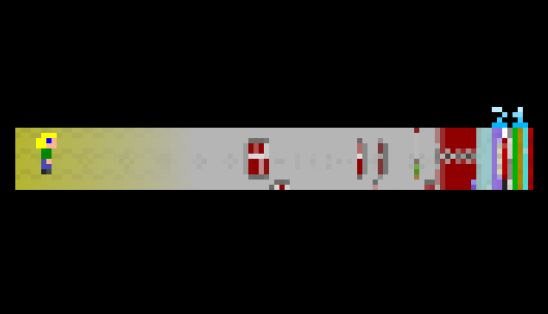Passage, created by Jason Rohrer, is an exercise in gaming minimalism. Made for korokomi’s gamma 256 competition, It’s only five minutes long, it weighs in at less than 500kb, it takes place on a 100×16 field of pixels, and it only requires the arrow keys.
It’s also one of the most clever, meaningful, affecting, and memorable games ever made.
To say too much about Passage before you’ve played it — to describe how I played through it, and how it affected me — is to spoil it. Passage is about life: what it feels like, how we live it, and how we find happiness. There is no true “right” or “wrong” way the play the game, and much of Passage‘s brilliance can only be understood through completing it yourself.
Let it be known, however, that whatever emotions you feel, whatever symbolism you notice, or whatever meaning you derive from the game’s movement and visual mechanics, were all totally intentional. The “games as art” debate is officially over.
Play it, come back here, and share your experience in the comments. This is the sort of game which warrants a hell of a lot of discussion. If you’re so inclined, go ahead and hit the jump for my personal experience with the game (though, honestly, it doesn’t matter; the game is about whatever you got out of it, not anecdotal BS from complete strangers).
[Thanks LordRegulus]
To me, Passage about the lonely, meandering nature of life. This is the only right intrepretation for me, and, hopefully, it is the exact wrong intrepretation for you.
LordRegulus, upon finishing the game, cried because he was so happy; Aaron Linde was “stunned,” but also rather shaken by the game’s deterministic view of aging and death as his 24th birthday approached. I cannot quite relate to either of their reactions, but I can sympathize with them: I can understand why they got what they did from the game, if only because Passage is such a wonderfully reflective piece: you get out of it what you put into it. The way you play through the game determines not only what sort of gamer you are — do you search every nook and cranny for every last secret, or do you quest onward in hopes of seeing new things and reaching the “end” — but, perhaps, what sort of person you are.
My first time through the game, I missed the female companion entirely. I only later found out from Aaron that she existed at all; initially, I moved downward and completely missed a character who, I assume, symbolizes the love of my life. To be completely blunt, this is the only part of the game which didn’t really strike a chord with me: I can dig that we sometimes move through life so fast, distracted by our goals and hopes that we miss the lovely people right in front of us, but I would have liked such a moment to come a little later in the game. Near the beginning, I was still under the impression that Passage was just another game, and I hadn’t quite gotten a grip on the game’s controls or sensibilities.
But through missing the companion altogether, I incidentally played through the game in a way which resonated much more with me. Without turning this into a gussied-up LiveJournal post, I related much more to the idea of playing through Passage by my lonesome than with a pretty 8-bit companion. Free to walk down paths I couldn’t possibly have entered with the companion in tow, I continued onward. I meticulously searched for treasure chests until I got tired of exploring and just wanted to see the sights: I involuntarily kept a constant eye to my score, trying to quantify my level of achievement within the game. Always on my own, with nothing but the scrolling landscape, the haunting music, and the silent score counter always increasing.
It took me almost half the game to notice I was aging. By the time I realized what was going on, I suddenly became much more frantic; I no longer had the ability to see what was coming, and I took on a much more panicked pace as I tried to quickly progress through the landscape, touching treasure chests only if they happened to cross my path. More often than not, however, the chests were filled with flies, and time after time I failed to notice that the colored gems on each chest served as a clue for what lay inside. I stubbornly hit every chest, without stopping to think that it might be more beneficial to look carefully and choose wisely.
By the time I realized what was happening — why my avatar was slowly moving to the rightmost portion of the screen — I became profoundly depressed. I could quite literally see the end coming, and could only focus on where I’d been; the music began to take a subtly funereal tone as I realized for all my adventuring, for all my treasure-searching and overcoming obstacles on the land, I would never reach any true “end.” There’s nothing at the end of the path save for death; to keep going would be pointless.
But I did it anyway, because, hell, what else was I going to do? I was alone, miserable, and had only the memories of scored points and treasure chests to keep my company, but it’s not like I could stop. Better to play it through to the end, no matter how meaningless my actions beforehand had been.
So I kept playing. And I died. The score was reasonably high (1600 or so), but it was just a meaningless number — measuring past successes which didn’t really mean much once my character turned into a grey, immovable tombstone. I was not crying with happiness at the end of this game.
But that’s just me. What about you?








